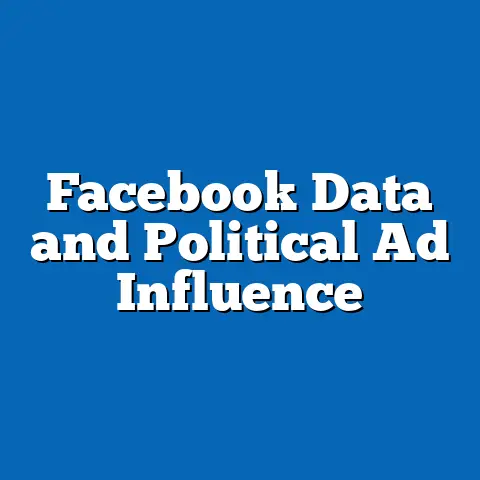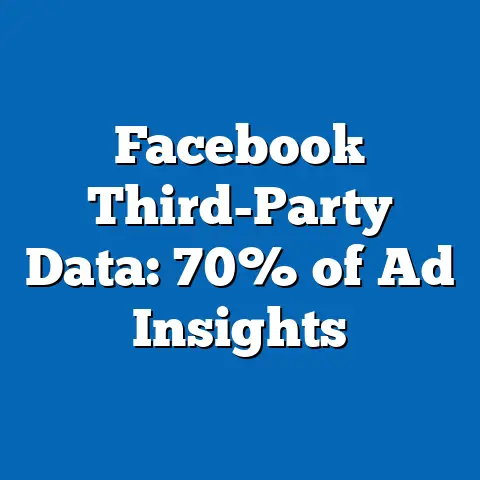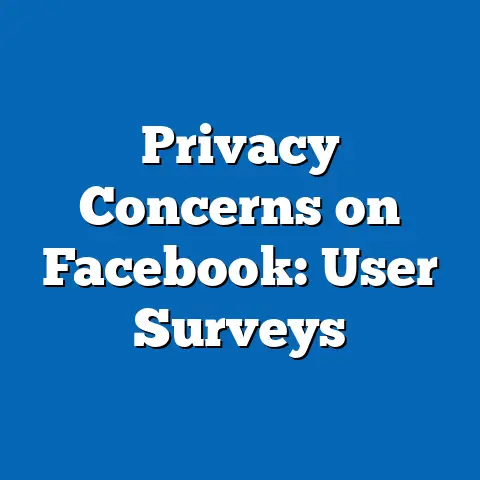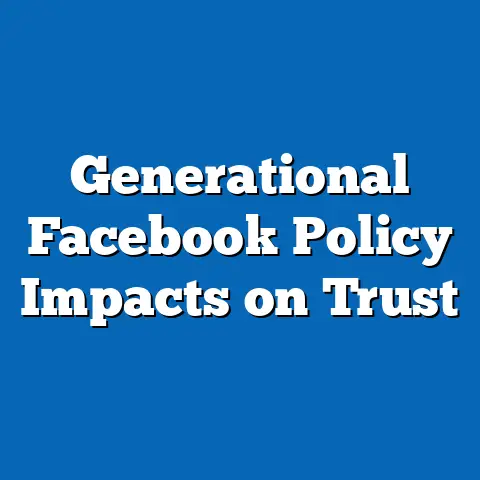Facebook Cambridge Analytica Fallout: Numbers
In early 2018, the world learned of a significant breach of trust in the digital sphere when news broke about Cambridge Analytica, a political consulting firm, improperly accessing personal data from millions of Facebook users to influence political campaigns, including the 2016 U.S.
presidential election and the Brexit referendum.
This scandal not only shook public confidence in social media platforms but also sparked a broader conversation about data privacy, digital ethics, and the role of tech companies in safeguarding user information.
As we reflect on this pivotal moment, this fact sheet provides a comprehensive, data-driven analysis of the fallout from the Cambridge Analytica scandal, focusing on user behavior, trust in social media, and demographic variations in response to the crisis.
Today, privacy concerns remain at the forefront of public discourse, with 64% of U.S.
adults expressing worry about how companies use their personal data, according to a 2023 Pew Research Center survey.
The Cambridge Analytica incident serves as a benchmark for understanding shifts in public attitudes toward data security and the enduring impact on Facebook’s user base.
This report examines current statistics, historical trends, demographic breakdowns, and the long-term implications of the scandal on user engagement and trust.
Section 1: Scope of the Cambridge Analytica Scandal
The Cambridge Analytica scandal involved the unauthorized harvesting of personal data from up to 87 million Facebook users worldwide, as reported by Facebook in April 2018.
This data was obtained through a third-party app, “This Is Your Digital Life,” which collected information not only from users who downloaded the app but also from their friends’ profiles due to lax privacy settings at the time.
The data was allegedly used to create psychographic profiles for targeted political advertising.
Facebook’s initial estimate of affected users was 50 million, but this figure was revised upward to 87 million within weeks of the scandal’s public disclosure.
Of these, approximately 70.6 million were U.S.-based accounts, representing about 32% of the U.S.
population at the time.
Globally, the breach affected users in countries such as the United Kingdom (1.1 million), the Philippines (1.2 million), and Indonesia (1 million), highlighting the international scope of the incident.
Section 2: Immediate Impact on Facebook Usage (2018-2019)
Following the scandal, there was a measurable shift in user behavior on Facebook, with many reevaluating their relationship with the platform.
A Pew Research Center survey conducted in May 2018 found that 54% of U.S.
Facebook users had adjusted their privacy settings in response to the news about Cambridge Analytica.
Additionally, 42% reported taking a break from checking the platform for several weeks or more, while 26% said they had deleted the Facebook app from their phones.
Year-over-year data shows a slight decline in daily active users (DAUs) in the U.S.
and Canada, from 185 million in Q1 2018 to 183 million in Q1 2019, a drop of 1.1%, according to Facebook’s quarterly reports.
While this decline was modest, it marked the first sustained dip in user engagement in these regions since the platform’s inception.
In contrast, global DAUs continued to grow, rising from 1.45 billion in Q1 2018 to 1.56 billion in Q1 2019, an increase of 7.6%, suggesting that the scandal’s impact was more pronounced in Western markets.
Section 3: Long-Term Trends in Trust and Engagement (2020-2023)
Over the years following the scandal, trust in Facebook and other social media platforms has remained a significant concern.
According to a 2023 Pew Research Center survey, only 27% of U.S.
adults say they trust Facebook to handle their personal data responsibly, down from 36% in 2019.
This represents a 25% decline in trust over four years, underscoring the lasting damage of the Cambridge Analytica fallout.
Engagement trends also reflect a nuanced picture.
While global DAUs on Facebook reached 2.11 billion by Q3 2023, a 44.5% increase from Q1 2018, growth in the U.S.
and Canada has been stagnant, with DAUs hovering around 198 million in Q3 2023, up only 7.0% from 2018 levels.
This slower growth rate contrasts sharply with regions like Asia-Pacific, where DAUs grew by 68.3% over the same period, indicating that privacy concerns may have disproportionately affected user retention in North America.
A notable trend is the shift toward alternative platforms perceived as more privacy-conscious.
For instance, usage of messaging apps like Signal and Telegram saw spikes post-2018, with Signal reporting a 1,200% increase in downloads in the U.S.
between March 2018 and January 2021.
While not all of this growth can be attributed to the Cambridge Analytica scandal, privacy concerns were frequently cited by new users in surveys conducted during this period.
Section 4: Demographic Breakdown of User Responses
The response to the Cambridge Analytica scandal varied significantly across demographic groups, reflecting differences in privacy concerns, tech savviness, and reliance on social media.
Below, we break down key findings by age, gender, education, and political affiliation based on Pew Research Center surveys from 2018 to 2023.
4.1 Age
Younger users (18-29) were the most likely to take action following the scandal, with 60% reporting in 2018 that they had adjusted their privacy settings, compared to 52% of those aged 30-49 and 46% of those aged 50 and older.
Additionally, 32% of 18-29-year-olds deleted the Facebook app from their phones in 2018, nearly double the rate of those aged 50+ (17%).
However, by 2023, younger users were also the most likely to return to the platform, with 71% reporting regular use, compared to 58% of those aged 50+.
This suggests a complex relationship with the platform among younger users, balancing privacy concerns with social and professional reliance on social media.
Older adults, while less likely to take immediate action, showed a more sustained decline in trust, with only 22% expressing confidence in Facebook’s data handling in 2023, compared to 30% of 18-29-year-olds.
4.2 Gender
Gender differences in response to the scandal were less pronounced but still notable.
In 2018, 57% of women adjusted their privacy settings compared to 51% of men, reflecting a slightly higher concern about data security among women.
Women were also more likely to take breaks from the platform (45% vs.
39% of men) in the immediate aftermath.
By 2023, trust levels had declined similarly for both genders, with 26% of women and 28% of men expressing confidence in Facebook’s data practices.
Engagement levels also showed minimal gender disparity, with roughly 65% of both men and women reporting regular use of the platform.
4.3 Education
Education level played a significant role in how users reacted to the scandal.
College graduates were the most likely to take protective measures, with 62% adjusting privacy settings in 2018, compared to 50% of those with a high school diploma or less.
Additionally, 30% of college graduates deleted the app, compared to 22% of those with less education.
This trend aligns with broader patterns of digital literacy, as more educated users often have greater awareness of data privacy risks.
However, by 2023, trust levels across education groups had converged, with only 25-28% of all groups expressing confidence in Facebook, indicating that the scandal’s impact on perception transcended educational divides over time.
4.4 Political Affiliation
Political affiliation revealed stark differences in response to the Cambridge Analytica scandal, particularly given its ties to political campaigns.
In 2018, 58% of Democrats and Democratic-leaning independents adjusted their privacy settings, compared to 49% of Republicans and Republican-leaning independents.
Democrats were also more likely to delete the app (29% vs.
22% of Republicans), reflecting greater concern about data misuse in political contexts.
By 2023, trust in Facebook remained lower among Democrats, with only 24% expressing confidence compared to 31% of Republicans.
This gap may be influenced by ongoing political narratives around data misuse and election interference, which have resonated more strongly with Democratic audiences.
Section 5: Public Perception of Data Privacy Post-Scandal
The Cambridge Analytica scandal catalyzed broader awareness of data privacy issues, extending beyond Facebook to other tech platforms.
A 2023 Pew Research Center survey found that 81% of U.S.
adults believe the risks of data collection by companies outweigh the benefits, up from 66% in 2018.
Additionally, 70% support stricter regulations on how companies handle personal data, a 15-percentage-point increase from 2018.
Specific to Facebook, public perception remains largely negative.
Only 32% of U.S.
adults believe Facebook is transparent about its data practices, down from 41% in 2019.
This erosion of trust is compounded by subsequent privacy controversies, but the Cambridge Analytica scandal remains a reference point for many, with 48% of adults in a 2023 survey citing it as a reason for their skepticism toward social media companies.
Section 6: Regulatory and Corporate Responses
The fallout from Cambridge Analytica prompted significant regulatory and corporate actions.
In the U.S., Facebook agreed to a $5 billion settlement with the Federal Trade Commission (FTC) in 2019, the largest penalty ever imposed for privacy violations.
The settlement also mandated stricter oversight of data handling practices and the appointment of independent privacy assessors.
Globally, the scandal accelerated the implementation of data protection laws, such as the European Union’s General Data Protection Regulation (GDPR), which came into effect in May 2018.
The GDPR imposes fines of up to 4% of a company’s annual global revenue for non-compliance, and Facebook has faced multiple penalties under this framework, including a €1.2 billion fine in 2023 for data transfer violations.
On the corporate side, Facebook (now Meta) introduced several privacy-focused updates, including limiting third-party app access to user data and launching a “Privacy Checkup” tool.
Despite these efforts, user trust has been slow to recover, as evidenced by the sustained low confidence levels reported in surveys.
Section 7: Comparative Analysis: Facebook vs. Other Platforms
While Facebook bore the brunt of public scrutiny following Cambridge Analytica, other social media platforms have not escaped privacy concerns.
A 2023 Pew Research Center survey found that trust in Twitter (now X) stands at 29%, only slightly higher than Facebook’s 27%, while Instagram (also owned by Meta) fares marginally better at 35%.
This suggests a broader crisis of confidence in social media as a whole.
However, platforms like TikTok face even greater skepticism, with only 21% of U.S.
adults expressing trust in its data practices, likely influenced by concerns over foreign ownership and data security.
In contrast, smaller platforms like Signal and Telegram, which prioritize encryption, have seen growing user bases, though they remain niche compared to Facebook’s 3 billion monthly active users as of 2023.
Section 8: Key Patterns and Shifts
Several notable patterns emerge from the data on the Cambridge Analytica fallout.
First, the scandal had a more pronounced and lasting impact on trust and engagement in Western markets, particularly the U.S., compared to other regions where growth in user numbers remained robust.
Second, demographic differences, especially by age and political affiliation, highlight varying levels of concern and action, with younger and more politically liberal users initially showing greater responsiveness.
Third, the incident marked a turning point in public awareness of data privacy, contributing to a sustained push for regulation and corporate accountability.
Finally, while Facebook has maintained its dominance in terms of user numbers, the scandal has contributed to a fragmented social media landscape, with users exploring alternatives perceived as more secure.
Section 9: Conclusion
The Cambridge Analytica scandal remains a defining moment in the history of social media and data privacy, with lasting implications for user trust, corporate practices, and regulatory frameworks.
Current data shows that while Facebook has retained a massive global user base, confidence in its data handling remains low, particularly in the U.S., where only 27% of adults trust the platform as of 2023.
Demographic variations reveal nuanced responses, with younger users and Democrats showing greater initial concern, though trust erosion has since become more uniform across groups.
As privacy concerns continue to shape the digital landscape, the legacy of Cambridge Analytica serves as a reminder of the vulnerabilities inherent in data-driven platforms.
This fact sheet provides a foundation for understanding these dynamics through a detailed examination of numbers, trends, and impacts.
Methodology and Sources
This fact sheet draws on data from multiple sources, including Pew Research Center surveys conducted between 2018 and 2023, focusing on U.S.
adults’ attitudes toward social media and data privacy.
Survey sample sizes ranged from 1,500 to 4,500 respondents per study, with margins of error between ±2.5% and ±3.1% at a 95% confidence level.
Additional data on user engagement and global metrics were sourced from Meta’s quarterly earnings reports (2018-2023) and public statements.
Demographic breakdowns were derived from weighted survey data to ensure representativeness across age, gender, education, and political affiliation.
International impacts were assessed using reports from regulatory bodies such as the European Data Protection Board and secondary sources like Statista.
All figures are rounded to the nearest whole number or decimal place for clarity.
For further details on survey methodologies, refer to the Pew Research Center’s website (www.pewresearch.org).
Historical context on the Cambridge Analytica scandal was compiled from contemporary news reports and official statements by Facebook and regulatory authorities.






